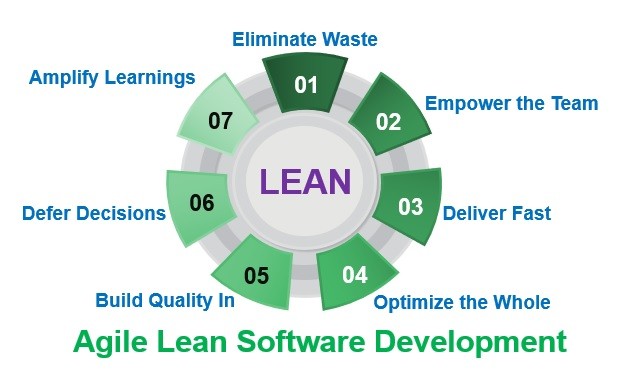Lean Software Development
What is Lean Software Development?
Definition
Lean Software Development is a methodology that focuses on optimizing efficiency and minimizing waste in the software development process. It emphasizes delivering high quality software quickly and efficiently by applying principles derived from lean manufacturing, particularly those pioneered by Toyota. Lean Software Development aims to create more value for customers with fewer resources by streamlining workflows, improving communication, and eliminating unnecessary tasks.
Analogy:
Imagine Lean Software Development as a welloiled assembly line in a factory. Just as a manufacturing assembly line is designed to produce goods with minimal waste and maximum efficiency, Lean Software Development organizes the software creation process to deliver highquality products with minimal waste and optimal use of resources.
Key Principles of Lean Software Development
Eliminate Waste: Identify and remove any activity that does not add value to the customer, such as unnecessary documentation or redundant processes.
Build Quality In: Integrate quality assurance throughout the development process rather than relying on endstage testing alone.
Create Knowledge: Encourage continuous learning and knowledge sharing to improve skills and processes.
Defer Commitment: Make decisions based on facts and data rather than assumptions, allowing flexibility and adaptability in the development process.
Deliver Fast: Prioritize speed and agility to quickly deliver functional software and respond to customer feedback.
Respect People: Empower and respect the development team, encouraging collaboration and continuous improvement.
Optimize the Whole: Focus on optimizing the entire development process, from initial concept to final delivery, rather than suboptimizing individual components.
Types of Lean Software Development
Kanban: A visual workflow management method that helps teams manage and improve their work processes by visualizing tasks on a board and limiting work in progress.
Scrum: An iterative and incremental agile framework for managing software projects, focusing on collaboration, accountability, and continuous improvement through regular sprints and reviews.
Key Components of Lean Software Development
Value Stream Mapping: A tool used to visualize and analyze the flow of information and materials required to bring a product to the customer, identifying areas for improvement.
Continuous Integration (CI): A practice where developers frequently integrate code changes into a shared repository, allowing for early detection of defects and faster delivery.
Automated Testing: The use of software tools to automatically execute tests on the codebase, ensuring that changes do not introduce new defects and maintaining software quality.
Small Batch Sizes: Working on smaller chunks of work to reduce the risk of errors, improve focus, and accelerate feedback and delivery cycles.
Why is Lean Software Development Important?
Efficiency: By eliminating waste and optimizing processes, Lean Software Development enhances efficiency and productivity.
Quality: Building quality into the process ensures higherquality software, reducing the need for extensive rework and bug fixes.
Customer Satisfaction: Faster delivery and continuous improvement lead to products that better meet customer needs and expectations.
Team Morale: Respecting and empowering the development team fosters a positive work environment and encourages innovation and collaboration.
Examples and Usage
Toyota: The principles of Lean Software Development are derived from the Toyota Production System, which revolutionized manufacturing with its focus on efficiency and quality.
Spotify: The music streaming giant uses lean and agile methodologies to continuously deliver new features and improvements to its platform.
Dropbox: The cloud storage service employs lean principles to streamline its development processes, ensuring rapid and reliable updates.
Key Takeaways
- Lean Software Development is a methodology that optimizes efficiency and minimizes waste in software development.
- Key principles include eliminating waste, building quality in, creating knowledge, deferring commitment, delivering fast, respecting people, and optimizing the whole.
- It can be implemented using frameworks like Kanban and Scrum.
- Key components include value stream mapping, continuous integration, automated testing, and working in small batch sizes.
- Lean Software Development improves efficiency, quality, customer satisfaction, and team morale.
- Companies like Toyota, Spotify, and Dropbox exemplify the successful application of lean principles.
Table of Contents





